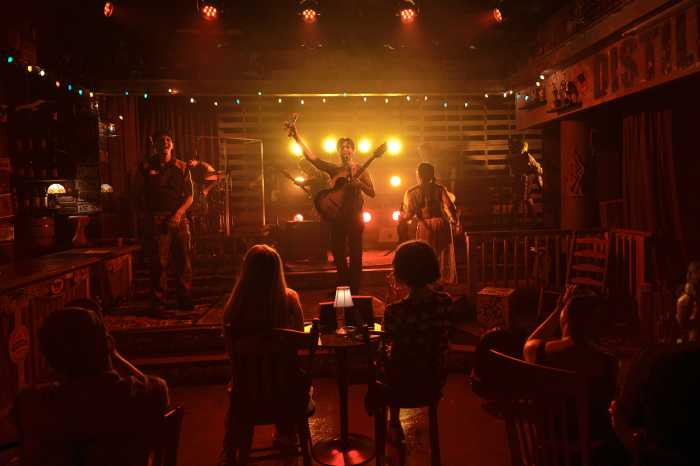Tim Wolff’s gay Mardi Gras ball doc fails to fire
There is nary a mention of Tennessee Williams himself in Tim Wolff’s disappointing documentary “The Sons of Tennessee Williams,” which chronicles five decades of gay Mardi Gras balls in New Orleans.
True, “A Streetcar Named Desire” is referenced a few times. One of the drag queens is named Blanche. But that’s about it. Any connection between the great gay playwright, who lived in Nawlins for a spell, and the members of the krewes planning such balls apparently comes from the spirit that infuses their revels.
What is clear is that these gay rights pioneers have been dressing in costume and attending Mardi Gras parades since they were kids — though, as they came of age, their wardrobes grew more elaborate and flamboyant. Watching one ball’s Queen hitching up an enormous train, viewers may wonder about its weight, not to mention its cost and how long it took to make. Of course, charming southern gentlemen do not discuss such matters.
They also didn’t discuss their sexuality with their families. Moms may — or may not — have known their sons were queer, but discretion ruled the day. It was simply not discussed, viewers are told.
“We didn’t put our lifestyle out on the street,” says Jimmy, one interviewee, who seems vaguely bitter about that silence.
But, overall, it is hard to tell how the dozen or so men profiled in the documentary feel about things. Late in the film, one man, whom we hear but don’t see, laments that if California can’t have gay marriage, what are the chances for Arkansas. Audiences won’t miss his sense that his generation did their part in New Orleans, so the next generation should start doing theirs, but his perspective could have been explored more fully.
More compelling is the film’s historical look at how gay men managed to forge community during decades of heinous adversity. The men all grew up in the 1950s when a newspaper column published the names of gay men arrested for lewd behavior, which consistently led to them being fired from their jobs. A “queer who was rolled” by three college students died from blows to the head, but the attackers were acquitted.
Dixie’s was a popular gay establishment that also proved an anchor for queer life under assault. When a drag ball out of town was raided — and men hiding in trees were discovered because police flashlights caught their sequins — Dixie’s owner sent bail money to release its attendees.
Outside of Dixie’s, the Mardi Gras krewes provided the only safe social outlet for gay men, hosting campy “debutramp” balls. To school krewe members unversed in doing makeup, they hired an undertaker, though his lack of experience on life models proved a distinct drawback.
These anecdotes suggest the joys that sustained the krewes, but the film fails in capturing enough of the camaraderie among members to animate this history for those who did not live it.
In a more serious vein, the film talks about the losses krewes experienced from AIDS, their working together in response to Katrina, and their rallying behind District Attorney Harry Connick, Sr., who in 30 years in office beginning in 1973, became a champion of the LGBT community.
Still, whether exploring the carnival spirit of krewes or their significance in building a safe space for queer life, director Tim Wolff largely just skims the surface of what ought to be an interesting story. One man is reluctant to do drag for his first time, but we’d love to know more specifically how he felt. We see fabulous costumes — New York Cheesecake being a particular standout — but get little feeling of how the costumes enlivened an evening at a ball.
“The Sons of Tennessee Williams” is too often like watching someone else’s home movies — you can’t escape the feeling you just had to be there.
Essentials:
THE SONS OF TENNESSEE WILLIAMS
Directed by Tim Wolff
First Run Features
Opens Oct. 7
Quad Cinema, 34 W. 13th St.

































